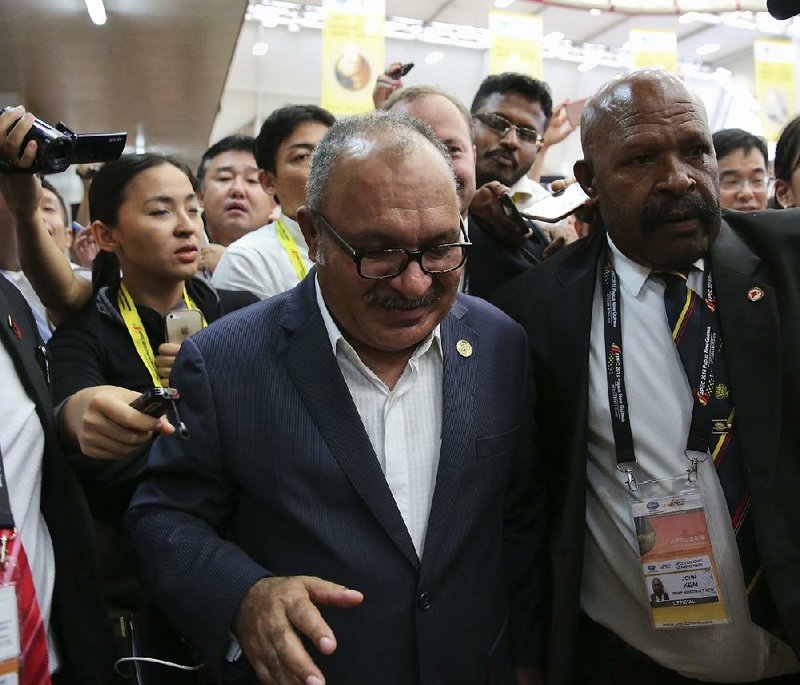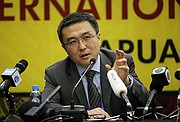SYDNEY -- The trade dispute between the United States and China has led to a standoff at a summit meeting of Pacific Rim leaders in Papua New Guinea, leaving the gathering of 21 nations without a joint closing statement on Sunday for the first time since the forum was founded.
The Asia-Pacific Economic Cooperation, known as APEC, has not ended without a joint statement since 1989, when the forum was established in Australia. Experts said the stalemate would set up a high-stakes showdown at the Group of 20 conference in Argentina this month -- which President Xi Jinping of China and President Donald Trump are expected to attend -- while intensifying frustration among countries caught in the crossfire.
"The entire world is worried," said Prime Minister Peter O'Neill of Papua New Guinea after he confirmed that only a summary of discussion would be issued, not a joint statement.
O'Neill said the issue of World Trade Organization reforms was the main cause of disagreement among leaders. Nations have been calling for key changes, including around dispute settlement, while the Trump administration has threatened to pull out of the body if it doesn't treat the U.S. more fairly.
The disagreement among Asia-Pacific Economic Cooperation leaders wasn't "only the U.S. and China," O'Neill told a scrum of reporters, who followed him out of the closing news conference after he initially didn't take questions. "There are other members who expressed opinions" about World Trade Organization reforms, he said.
The disagreement concerned issues that have shaped the trade dispute between the United States and China for months.
Draft versions of the communique showed that the United States wanted strong language condemning unfair trade practices like those that it says China regularly deploys, including restricting market access and pushing foreign companies to hand over valuable technology.
The Chinese delegation sought to reaffirm its opposition to what it says are protectionism and unilateralism practices by the United States, especially the U.S. trade tariffs on hundreds of billions of dollars' worth of Chinese goods.
A U.S. official familiar with the talks said China balked at some language related to trade. At issue was a pledge by the governments to fight "all" unfair practices, which China objected to including in the statement, said the official, who asked not to be identified as the discussions were private. The 20 other nations endorsed the language, the official said.
The opposing positions were staked out in stark terms on Saturday, with combative speeches by Xi and Vice President Mike Pence. Both men argued that their country had the best interest of the region at heart, battling for loyalty within a trade group that represents 60 percent of the global economy.
But they also pushed each other toward conflict and escalation.
Pence, appearing in Trump's place, doubled down on recent criticism of China's geopolitical strategies and attacked the country's "One Belt, One Road," initiative -- an infrastructure plan financed by China that covers some 70 countries.
He urged Asian nations to work with the United States, which, he said, would not saddle them with debt, an issue some countries are facing as a result of their partnerships with Beijing.
Xi, speaking before Pence, insisted that the criticism was misguided, arguing that China's infrastructure plan would be inclusive and beneficial.
"It will not close a door and create a small circle," Xi said. "It is not the so-called trap, as some people say. It is the sunshine avenue where China shares opportunities with the world to seek common development."
Experts said the dueling arguments appeared to have become more entrenched.
"It boils down to mutual intransigence between the U.S. and China," said Rory Medcalf, head of the National Security College at the Australian National University.
Jonathan Pryke, a Pacific Rim expert at the Lowy Institute, agreed, describing the result as raw "stubbornness."
The tensions reportedly boiled over as summit host Papua New Guinea tried to draft the communique. Agence France-Presse said that Chinese officials attempted to "barge" into the office of the country's foreign minister to influence the document. Chinese officials denied the report, which said police had to be called.
"The incident that you mentioned is a rumor spread by some people with a hidden agenda," said Wang Xiaolong, director-general of the Department of International Economic Affairs at China's foreign ministry.
Wang said issues related to the World Trade Organization "have to be discussed and decided on a broad-based process beyond this region."
Earlier on Sunday, Prime Minister Scott Morrison of Australia tried to sound upbeat. "I think there is a lot more progress being made here than I think is probably being acknowledged," he said.
But by Sunday night, it was increasingly difficult to see the summit meeting as anything but a continuation of hostilities.
Prime Minister Justin Trudeau of Canada was among the first to make clear that the negotiations had not yielded a resolution.
"I don't think it will come as a huge surprise that there are differing visions," he said. "Those prevented there from being a full consensus on the communique."
Information for this article was contributed by Damien Cave of The New York Times and by Jason Scott and Dandan Li of Bloomberg News.
A Section on 11/19/2018

